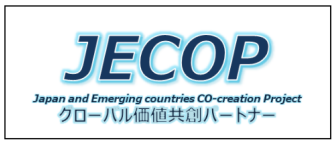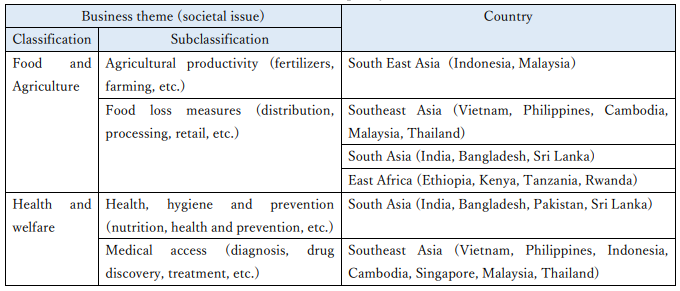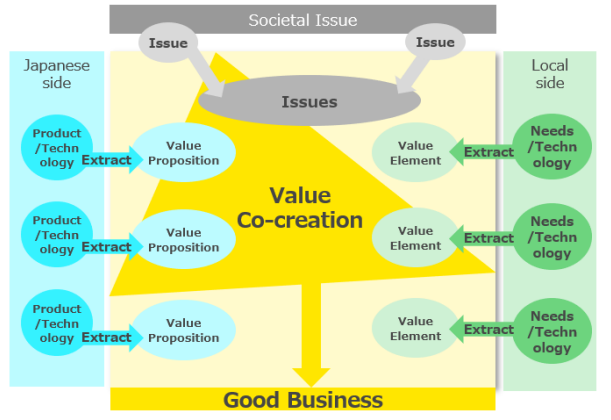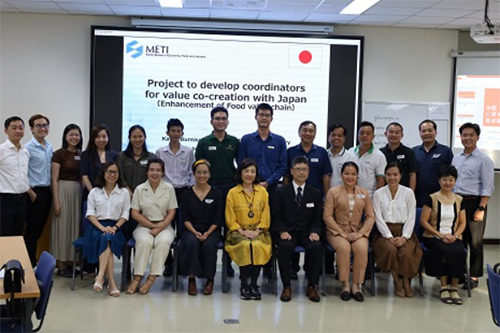The Ministry of Economy, Trade and Industry, Japan (METI) supports the overseas expansion of SMEs through various policies. Among them, the Kanto Bureau of Economy, Trade and Industry (Note 1) (Kanto-METI. one of regional bureaus of METI which is responsible for supporting small and medium-sized enterprises (SMEs)), is promoting a policy called “JECOP” (Note 2) to create businesses between Japan and emerging countries, that could solve local (Note 3) societal issues and strengthen the competitiveness of Japanese SMEs as well.
I would like to introduce the outline of the policy briefly as follows (Note 4). First, I surveyed the history and current situation of the overseas business of Japanese companies, as a background of this policy. Next, I examined the scope and key points of this policy. Finally, I described its recent outcomes and future prospects.
■Background
A common recognition has emerged around the world that the critical issues are not only economic growth but also "global sustainability". Starvation, poverty, climate change, and human rights issues are obvious and significant global agendas, shared with almost all business stakeholders. The UN Sustainable Development Goals (SDGs) (adopted in 2015) can be said to be indicative of the many faces of these challenges. Once, Japan achieved high economic growth through exporting quality, high-tech manufactured products. But now, in addition to the change in the Japanese economic structure and Yen exchange rate, Japanese companies are facing the pressure to modify their business models which previously focused solely on selling technologies.
The high economic growth of emerging countries is conspicuous around the world. In the 20th century, countries which had achieved decolonization were subject to economic and political structural gaps with developed countries and came to be known as "peripheral countries” in the "World-system theory" proposed by Immanuel Wallerstein. However, these countries have now leveraged the leapfrogging effect by digital technology to engage in innovation without gradual or ordinal societal development. These developments are thanks to the fact that emerging economies are generally young societies, with a high interest in digital technology and innovation related to sustainable business. Against this backdrop, emerging economies such as India and those in Southeast Asia are overwhelming Japan in terms of the number of unicorns (companies that achieve a market capitalization of over US $1 billion in less than 10 years) (Note 5). These facts are a strong indication that the continuity and stability of Japanese companies (especially Japanese SMEs) are becoming increasingly unclear.
In this context, Kanto-METI came to the realization that the best model for Japanese companies is to become "co-creation partners". It is true that in the past Japanese companies used workers and companies in emerging countries as cheap labor forces or subcontractors. However, the status of Japanese companies has clearly changed and there is a need to be more respectful to stakeholders in emerging countries and to form more equal relationships that take advantage of each other’s strengths.
Therefore, Kanto-METI decided to launch a policy focusing on implementing business cooperation with local Asian companies and Japanese SMEs, with the aim of solving societal issues and realizing sustainability from the same point of view. The policy is named JECOP, Japan and Emerging countries CO-creation Project.

■The scope and key points of this policy
Kanto-METI selected "food and agriculture" and "health and welfare" as business themes for JECOP. At the same time, based on a regional analysis of Japanese ODA in recent years, they narrowed down 15 countries in Southeast Asia, Southwest Asia, and Sub-Saharan Africa as the most promising regions for this project.
The table below shows the scope of business themes and regions (Note 6).

Through feasibility studies and pilot matching events, the JECOP model was also developed. This support can be broadly divided into three phases.
- 1. Extract detailed information on local societal issues.
- 2. After conducting a detailed analysis of societal issues, technical elements of Japanese SMEs and the needs and technological seeds of local enterprises will be extracted.
- 3. Select the above - mentioned Japanese companies and local companies and match them at matching events.

The key success factors are local coordinators and the cooperation ecosystem that exists between support organizations. JECOP will become more effective if they are effectively fostered and developed.
The presence of a local coordinator at the time of co-creation would greatly assist Japanese companies that are concerned about local business, and it would be an important pipeline with local companies. An individual who has work experience in Japan, who has worked for a local Japanese company, or who is studying Japanese may be able to initiate excellent coordination in terms of business matching. If these people can connect with Kanto-METI, JECOP is expected to progress marvelously. As mentioned above, this will lead to the creation of massive profits in emerging countries.
In addition to Kanto-METI, there are many Japanese official supporters of the program, such as the Japan External Trade Organization (JETRO), the Japan International Cooperation Agency (JICA), and SME Support JAPAN, who have extensive experience in assisting Japanese companies and in tackling societal problems in emerging countries. Since these institutions may be well known among the local populations and have experience in collaboration, creating an ecosystem among them would be critical in carrying out JECOP in terms of making it more acceptable to the local populations.
■Recent outcomes and future prospects
First, in terms of utilizing local coordinators, Kanto-METI formed a partnership with the Association for Overseas Technical Cooperation and Sustainable Partnerships (AOTS) and the Africa Advisor of the United Nations Industrial Development Organization (UNIDO). In particular, the "AOTS Alumni Association," which has formed around the world, comprised of local personnel (returning trainees) who participated in the AOTS training, is a remarkable resource in the sense that it is a network of knowledge-based human resources that supports Japanese companies. In cooperation with the Ho Chi Minh City Alumni Society in Viet Nam ABK–AOTS DOSOKAI (Chennai, India), and ABK&AOTS Alumni Association (Thailand), which are particularly active in these fields, Kanto-METI conducted training programs to promote the JECOP model and foster their know-how as business coordinators.

Second, to substantially realize business matching, promising local companies were then sought through alumni (local coordinators) and the Africa advisor of UNIDO. At the same time, the Japanese side sought promising SMEs with the cooperation of a variety of Japanese supporters.
Third, the presence of the above coordinators who are familiar with local companies' strengths and value co-creation models has fostered opportunities for matching. As a result, business matching was successful for three new potential businesses: one in Vietnam, one in Thailand, and one in Ethiopia.
When we look back at these efforts, JECOP’s potential to create practical partnerships in the near future is easy to appreciate. I hope that JECOP will be used further as leverage in the co-creation of businesses in emerging countries, and also hope that efforts in other countries within the scope of JECOP will expand, that they will involve local coordinators more broadly, and increase the number of support organizations with which cooperation is facilitated in the future.
The Leaders' Communique of the G7 Hiroshima Summit held in May 2023, clearly states “We stress the critical role of development cooperation and international partnerships in addressing global challenges and the need to engage with international partners in solidarity” (Note 7). At a side event of the G7, Japanese Prime Minister Kishida mentioned infrastructure investment performance in various regions of the world, including the “Global South”, and expressed his intention to further promote mobilization of private funds (Note 8) for quality infrastructure. In this context, the term "infrastructure" includes not only the energy and transportation sectors where many large companies operate, but also various sectors such as agriculture, medical and healthcare which is covered by JECOP (Note 9). Therefore, I believe that the achievements of the G7 have also become a tailwind for JECOP.
If individuals in emerging countries are interested in business co-creation with Japan’s best SMEs, their enthusiastic participation in the JECOP model would be highly welcomed and appreciated.
June 6, 2023
>> The Japanese version of this article


